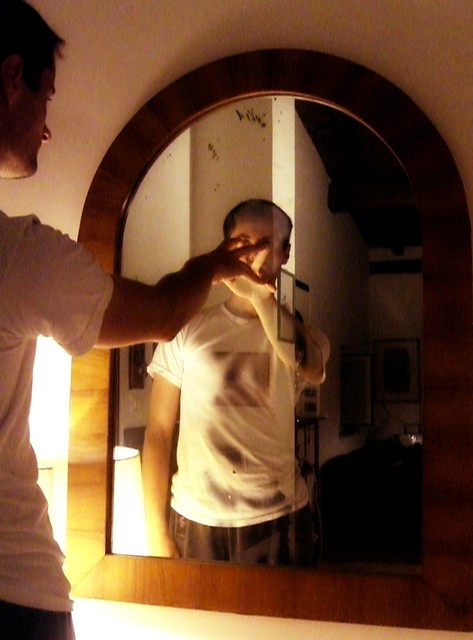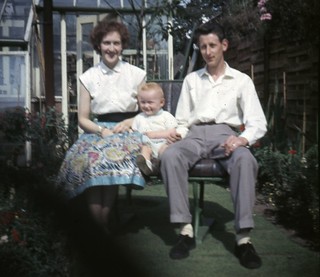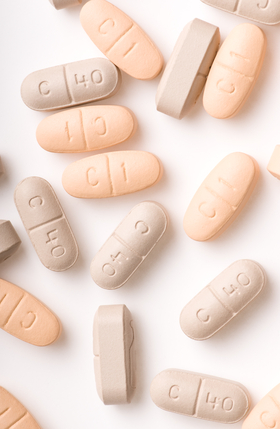Guyside: A few simple tasks — no crunches required
 If you (and I DO NOT recommend it) judged what male health was all about by looking at popular culture, I think it could be summed up in one word: abs. Walk past a magazine rack and it’s all abs, all the time. But there’s a lot more to it than that.
If you (and I DO NOT recommend it) judged what male health was all about by looking at popular culture, I think it could be summed up in one word: abs. Walk past a magazine rack and it’s all abs, all the time. But there’s a lot more to it than that.
When it comes to health, we men can be our own worst enemy. According to the US government’s Medline, men are more likely to smoke, to drink, to ignore symptoms, to put off health care visits, and to make risky health choices. So today, a few simple tasks to get you back on track if you’ve strayed.
#1: The next few times you’re at a pharmacy, use the automated blood pressure checker. If it’s high compared to the guidelines printed on the machine, DON’T ignore it. Follow up.
#2: Get a cholesterol check. This is especially important if you have a history of heart disease, but it’s a good idea for everyone.
#3: If you’re getting drunk regularly, slow down. Binge drinking isn’t good for anything and it’s pretty bad for your health.
#4: This is a tough one for a lot of guys. Colon Cancer. At its least invasive, you do one of those smear your poo on a stick and then on a test strip thing. Gross, but not too bad. The finger’s next. Sigmoidscopy and colonoscopy are the final frontiers, so to speak. I am a little squeamish about stuff related to the old intestinal system, but you know what? SUCK IT UP. It’s important.
#5: if you’re smoking? Stop. There’s nothing good for you there.
And the final tip: to borrow from the Homeland Security stuff, if you see something, say something. When I got diagnosed with bladder cancer, it was because I acted when I saw blood in my urine. If you see something abnormal related to your body, take action.
It’s easy to buy into the old lie that you’re invulnerable, that you haven’t changed since high school, even when you’re buckling your belt on a new hole and your hair is disappearing. And if it helps you in your job or your personal life to tell yourself that story, that’s fine. But when it comes to your health, holding to closely to the convenient delusion could be a life-threatening decision. Don’t do it.
Image: Creative-commons licenced from Flickr user Ed and Eddie.
Read MoreMirror, mirror, on Guyside’s wall…
 I recently came upon a photo of me that was about 10 years old or so. I didn’t think much of it, but then I took a closer look to see if I could spot the telltale signs of aging in it. It was hard. I’m a little heavier now than I was then (about 192 compared to about 185); there are more than a few gray hairs in my facial hair, but not much on top; I couldn’t see the advance of wrinkles.
I recently came upon a photo of me that was about 10 years old or so. I didn’t think much of it, but then I took a closer look to see if I could spot the telltale signs of aging in it. It was hard. I’m a little heavier now than I was then (about 192 compared to about 185); there are more than a few gray hairs in my facial hair, but not much on top; I couldn’t see the advance of wrinkles.
Trust me. I am not Dorian Gray. But I think that guys are able to see exactly what they want to see in mirrors or photographs. A classic Canadian folk song called “Lies” is about a woman confronting her face in the mirror, with one couplet: “She shakes off the bitter web she wove / Gently puts the mirror face down by the stove.” From the outside, at least, I think women look at themselves and see flaws, while men look at themselves and see an idealized version of themselves.
I don’t think I have to argue that for many women, body image is a big problem. But I want to argue that the male tendency to ignore reality isn’t an asset. If we “can’t see” the toll that time and our choices take on our body, then men could be opening ourselves up to health issues.
I was recently part of an online discussion where a mother was talking about how quickly her daughter would look at herself and wonder if she was too fat (this in elementary school!), while the girl’s quite-average-shaped younger brother would come to his mother and demand she demonstrate awe at his huge biceps and muscles! While I suspect that everyone in adolescence is hypersensitive to body issues (why don’t my boobs look like hers, why can’t I get rid of these pimples, why am I 6’1″ and weigh under 140 — that last one was me, by the way), it’s disconcerting to think that even in early childhood, there are already seeds of dissatisfaction with who we are, and the willingness to rely on our fantasy vision of ourselves rather than to simply acknowledge reality.
Since the 1980s, when I was thin enough, as my dad used to say, “to have to run around in the shower to get wet,” I’ve put on about 55 pounds. I needed some of that. But maybe not all of that. Even my idealized eyes can see that. I’ll never be a bodybuilder, never be “musclebound.” Given the raw material, I would have to either become an utter gym rat, or I’d end up using dangerous methods like steroids to achieve some level of muscularity. And I’m not willing to risk my health for an image. I like feeling fit, I like feeling toned. But for me, the “Men’s Health” six-pack or the arms of a pro wrestler aren’t worth it.
But the question then becomes: if you recognize the need for change, then how to make that change. Next week, I’ll be talking about cosmetic surgery for men.
(photo CC-licenced by Flickr user Michele di Trani)
Read MoreGuyside: “Engage” isn’t just for Captain Picard

Ian McKellen and Patrick Stewart may be appearing together in “Waiting for Godot” in New York, but even a Google search for their names will quickly give you the sense that they are great friends. (photo: BBC)
I had a feeling, but there’s data to support my gut: the demographic group with the smallest network of friends is… me. The adult, straight, white dude. I’m probably an outlier in that sense: I have a lot of people who I’m proud to call friends, some of whom are very close friends indeed.
But it appears that guys like me are in need of social engagement, and not just because we look weird sitting at the bar with a beer and a plate of chicken wings, alone. Actually, that sort of engagement — beer, food, a sporting event- – is often called “shoulder-to-shoulder” friendship. The counterpart to that is “face-to-face” friendship, and the big-brained folks who study such things suggest that women tend to have more face-to-face friends. F2F friends share more information about their lives, their emotions, and they derive more benefit from the friendship than do the friends who go to a concert or a movie together and may rarely talk about what’s happening in their lives.
I’ve come home from evenings out with a friend and had my partner ask “so, what’s new with George?” and be at a loss to tell her anything significant.
But the benefits of real friendship are as real as the friendship itself. A 2010 journal article makes the point that social isolation is one of the first things used to punish or torture, and that social engagement can halve the risk of death.
So let’s say you’re an aging guy, and you just don’t have friends you can realistically take from shoulder-to-shoulder to face-to-face. What to do?
Perhaps you should think about finding a volunteer activity. I tend to be a bit of an overachiever in this area; I say yes to way too many volunteer activities. Right now, for example, I’m on the production team for a major fundraising event for a choral festival, I’m raising money for a fundraising bicycle ride (BTW: DONATE!), I do a monthly radio piece on the history of folk music for a local community radio station, I’m part of a monthly ukulele get-together (you haven’t lived until you’ve been at a bar with 100 ukes!), I’m a sometime contributor to a local arts and culture web magazine, my partner and I do house concerts every month or so, I do this column, and I’m hatching a plan with friends to change the way chemotherapy drug costs are covered in my home province. That’s probably too much. But not all of it happens all the time, and I can always practice that “saying no” thing I’ve heard so much about.
All of those things expose me to new people and deepen my relationships with people over time (I’ve been involved with the Show Tune Showdown for 8 years). And volunteer activities have their own beneficial effects. A Canadian government report details the many benefits of volunteering for seniors:
- Building new relationships
- Sense of contribution to the local community
- Learning and practicing new skills that can be applied to other things
- Learning about new subjects
Even though that report is focused on seniors, I think the benefits extend down to someone of my tender years — or yours.
Read MoreGuyside: Dealing with aging parents, guyside style.

As parents age, we have to move from being “their child” to mutual independence to their dependence on us. It’s not always easy.
One of the things about getting to this age (in my case, 47) is that you get the odd experience of parenting your parents.
I was about the last child in my generation. With both parents near the end of large families, I have a ton of cousins, many of whom are well into retirement by now. And as a late child (born to 41-year-olds), my mom (and my dad, until his death in 2012) is well into seniorhood.
It’s probably no surprise that the dynamics change when your parents age. As a child, we strive for independence from our parents. That lasts for some time and then, like a wave collapsing in on itself and running back into the ocean, dependence begins to reach back out from your parents to you.
Things that were easily done for years become more difficult. It becomes more challenging for the senior citizen to take on some of the frustrations of daily living. And if physical illnesses encroach, as they almost certainly will, that process can accelerate more and more as time goes on.
So here, from my own experience and with the help of some references I’ve found, are some tips for dealing with aging parents:
- Find ways to detach emotionally just a bit. It’s difficult to hear a parent in emotional or health difficulty. But if your emotions take over, it’s going to be difficult to truly help them. Create an outlet for your emotions, but then work on logic.
- Sometimes just listening is enough. As a guy, I know only too well I can jump to SOLVING THE PROBLEM. But sometimes, your parent won’t want a solution; they’ll want a set of ears.
- Talk to your parent or parents about power of attorney. There are times at which you may need to intercede. It’s easier to do that if you have arranged things in advance.
- Support anything your parents are interested in doing that will help their physical, emotional, or mental health. Got a 97-year-old (like my aunt) who loves to swim? Make sure he or she gets to the pool. Is someone a bridge player? Find them a club. Often, seniors lose friends and family members as they age, so new social links are important.
- Build relationships with their health care providers. As seniors age, it’s more likely they’ll have serious health concerns crop up. And seniors are more likely to have a more deferential attitude toward doctors and medical professionals than younger people. So it’s important that you be able to play a role in their health care. This doesn’t mean taking over; it can mean being a trusted resource, an advocate, or maybe just a drive to an appointment.
What’s the latest on calcium supplements?
Calcium. Lord knows that both men and women need calcium for bone health. However, women in particular start to lose bone density as early as age 35 and, within the first 10 years of the onset of menopause, up to 50% of spongy, or trabecular bone (the network that makes up most of bone structure) and up to 30% of cortical bone (the outer shell) are also lost.
Despite its importance to bone health, there is a lot of controversy surrounding calcium, particularly when it comes to the recommended dietary allowance or RDA. Currently, the Institute of Medicine recommends that women between the ages of 19 and 50 ingest at least 1,000 mg a day and those over 50, 1,200 mg a day. Still, too much of a good thing is too much; an overreliance on supplementation (often as a result to avoid milk, yogurt, cheese and other dairy products) may increase the risk for heart disease and kidney stones.
In a review in the journal Menopause, researchers note that women who rely on supplements for their daily calcium needs more often than not take doses that exceed the RDA. The reason that this is problematic is that our bodies cannot absorb more than 500 mg daily of calcium from either food or supplements in any two-hour period, so if you are eating calcium rich foods (which in addition to the aforementioned dairy also includes canned fish with bones, tofu, calcium-fortified products, broccoli, collards and kale), also adding a daily supplement may take you to a place that you want to avoid. Importantly, while higher dietary calcium from food actually appears to reduce kidney stone formation and may even offer protection from heart disease, the opposite is true for supplements:
- In the Women’s Health Initiative study, exceedingly high intake of calcium (from a combination of diet and supplements) was shown to increase the risk for kidney stones by 17%.
- While the link between calcium supplements and heart disease is still being teased out, findings from a large review concluded that they raised the risk for heart attack by as much as 30%.
What should you do?
- Obtain as much calcium as you can from your diet to meet recommended daily goals and only take supplements if this is impossible or if recommended by your health practitioners.
- Contrary to popular belief, the RDA goal for calcium can often be reached by taking only 500 mg daily of calcium via supplement.
- If you are going to rely on calcium supplements, form matters. Researchers believe that calcium citrate may be less likely to cause kidney stones than calcium carbonate. And as I wrote back in 2009, there may be an advantage to a form of calcium known as ossein-hydroxyapatite complex (OHC), which is the mineral component of bones and teeth (OHC goes by the brand name of MCHA or MCHC and is easily found on the web).
Read More
Guest Post Roundup: Sex, Generations and A Whole Lotta Love
As we come closer to the year’s end, I’d like to express my gratitude to a few of my colleagues who took the time to publish their thoughts on Flashfree this year. And, althoughI receive a lot of solicitations, there are few that I feel are worthy of your time or your close read. These, on the other hand, rocked my world, not only because of their breadth and finesse but also because of the love behind the words and thoughts.
This is a Roundup that you don’t want to miss.
[Credit: Special and enduring thanks to artist Darryl Willison of whimsicalwest.com. Please visit his site and support his work!]
- Should fatties get a room? Dr. Brian Hughes has lent his fine prose to this blog several times and often writes insightfully about how our society takes advantage of women. When I stumble across something on his blog that screams Flashfree, I reach out and say pretty please. Brian rocks!
- Should I or shouldn’t I? Oncologist, journalist and educator Dr. Elaine Shattner has spent most of her online bandwidth on discerning the facts about breast and other cancers. Let’s face it; there is a lot of information swirling around the Interwebz and when it comes to figuring out what it means, well, the challenge can be daunting. Want to know more? Elaine’s your girl for the 4-11.
- Anti Anti-Aging, Pro Great Glow. Do you want to fight your years? Or fight FOR them? Writer and author D.A. Wolfe dishes up some provocative prose and challenges the inner you. This one’s got “win” written all over it.
- Counterterrorism, women and 9-11. Doesn’t sound like a topic for Flashfree, does it? But my friend Anne Weiskopf shares a poignant piece about what it means to be a woman. And a mother.
- Want to get your groove on? Move. Alexandra Williams, motivational speaker, fitness writer, radio host and inspirateur nails it with a wonderful post on sex, exercise and wellbeing.
- Vagina’s are like self-cleaning ovens. Wait! What?! Yes, gynecologist and sex expert Dr. Jen Gunter makes a guest appearance to shake up the idea that douching is a good idea.
- Have you crossed the Big M finish line? Author Sarah Bowen thought she had. And tells us how she hit the reset button before the race ended.
- On Becoming Bendy. Author Patti Digh is at it again. She’s changing our world, one day at a time. And wow, has she ever changed hers’ this year. Want to be a better you? Bendy. Who said that Gumby didn’t have an alterior motive?
- Are you becoming your mother? When was the last time you looked in the mirror and asked yourself the very question that my friend, motivational speaker and author Cherry Woodburn asks in this post? Are you a generational profiler?








